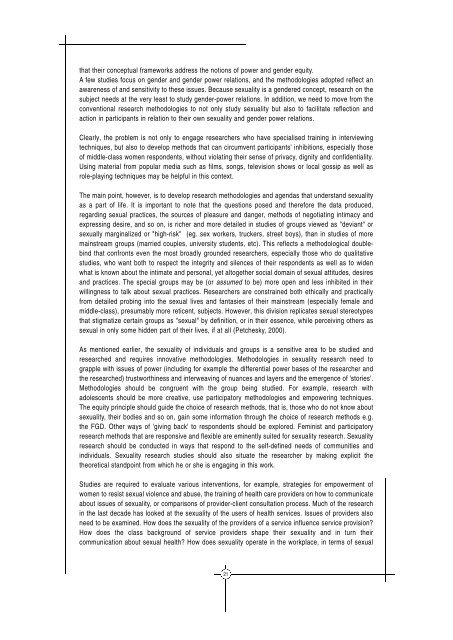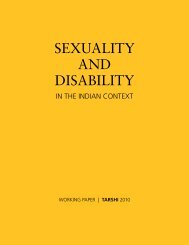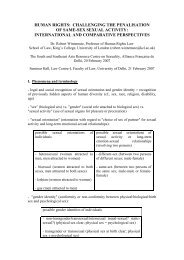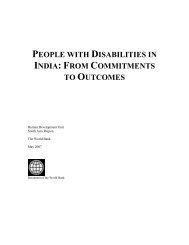FREE Download - TARSHI
FREE Download - TARSHI
FREE Download - TARSHI
Create successful ePaper yourself
Turn your PDF publications into a flip-book with our unique Google optimized e-Paper software.
that their conceptual frameworks address the notions of power and gender equity.<br />
A few studies focus on gender and gender power relations, and the methodologies adopted reflect an<br />
awareness of and sensitivity to these issues. Because sexuality is a gendered concept, research on the<br />
subject needs at the very least to study gender-power relations. In addition, we need to move from the<br />
conventional research methodologies to not only study sexuality but also to facilitate reflection and<br />
action in participants in relation to their own sexuality and gender power relations.<br />
Clearly, the problem is not only to engage researchers who have specialised training in interviewing<br />
techniques, but also to develop methods that can circumvent participants' inhibitions, especially those<br />
of middle-class women respondents, without violating their sense of privacy, dignity and confidentiality.<br />
Using material from popular media such as films, songs, television shows or local gossip as well as<br />
role-playing techniques may be helpful in this context.<br />
The main point, however, is to develop research methodologies and agendas that understand sexuality<br />
as a part of life. It is important to note that the questions posed and therefore the data produced,<br />
regarding sexual practices, the sources of pleasure and danger, methods of negotiating intimacy and<br />
expressing desire, and so on, is richer and more detailed in studies of groups viewed as "deviant" or<br />
sexually marginalized or "high-risk" (eg. sex workers, truckers, street boys), than in studies of more<br />
mainstream groups (married couples, university students, etc). This reflects a methodological doublebind<br />
that confronts even the most broadly grounded researchers, especially those who do qualitative<br />
studies, who want both to respect the integrity and silences of their respondents as well as to widen<br />
what is known about the intimate and personal, yet altogether social domain of sexual attitudes, desires<br />
and practices. The special groups may be (or assumed to be) more open and less inhibited in their<br />
willingness to talk about sexual practices. Researchers are constrained both ethically and practically<br />
from detailed probing into the sexual lives and fantasies of their mainstream (especially female and<br />
middle-class), presumably more reticent, subjects. However, this division replicates sexual stereotypes<br />
that stigmatize certain groups as "sexual" by definition, or in their essence, while perceiving others as<br />
sexual in only some hidden part of their lives, if at all (Petchesky, 2000).<br />
As mentioned earlier, the sexuality of individuals and groups is a sensitive area to be studied and<br />
researched and requires innovative methodologies. Methodologies in sexuality research need to<br />
grapple with issues of power (including for example the differential power bases of the researcher and<br />
the researched) trustworthiness and interweaving of nuances and layers and the emergence of 'stories'.<br />
Methodologies should be congruent with the group being studied. For example, research with<br />
adolescents should be more creative, use participatory methodologies and empowering techniques.<br />
The equity principle should guide the choice of research methods, that is, those who do not know about<br />
sexuality, their bodies and so on, gain some information through the choice of research methods e.g.<br />
the FGD. Other ways of 'giving back' to respondents should be explored. Feminist and participatory<br />
research methods that are responsive and flexible are eminently suited for sexuality research. Sexuality<br />
research should be conducted in ways that respond to the self-defined needs of communities and<br />
individuals. Sexuality research studies should also situate the researcher by making explicit the<br />
theoretical standpoint from which he or she is engaging in this work.<br />
Studies are required to evaluate various interventions, for example, strategies for empowerment of<br />
women to resist sexual violence and abuse, the training of health care providers on how to communicate<br />
about issues of sexuality, or comparisons of provider-client consultation process. Much of the research<br />
in the last decade has looked at the sexuality of the users of health services. Issues of providers also<br />
need to be examined. How does the sexuality of the providers of a service influence service provision?<br />
How does the class background of service providers shape their sexuality and in turn their<br />
communication about sexual health? How does sexuality operate in the workplace, in terms of sexual<br />
21










